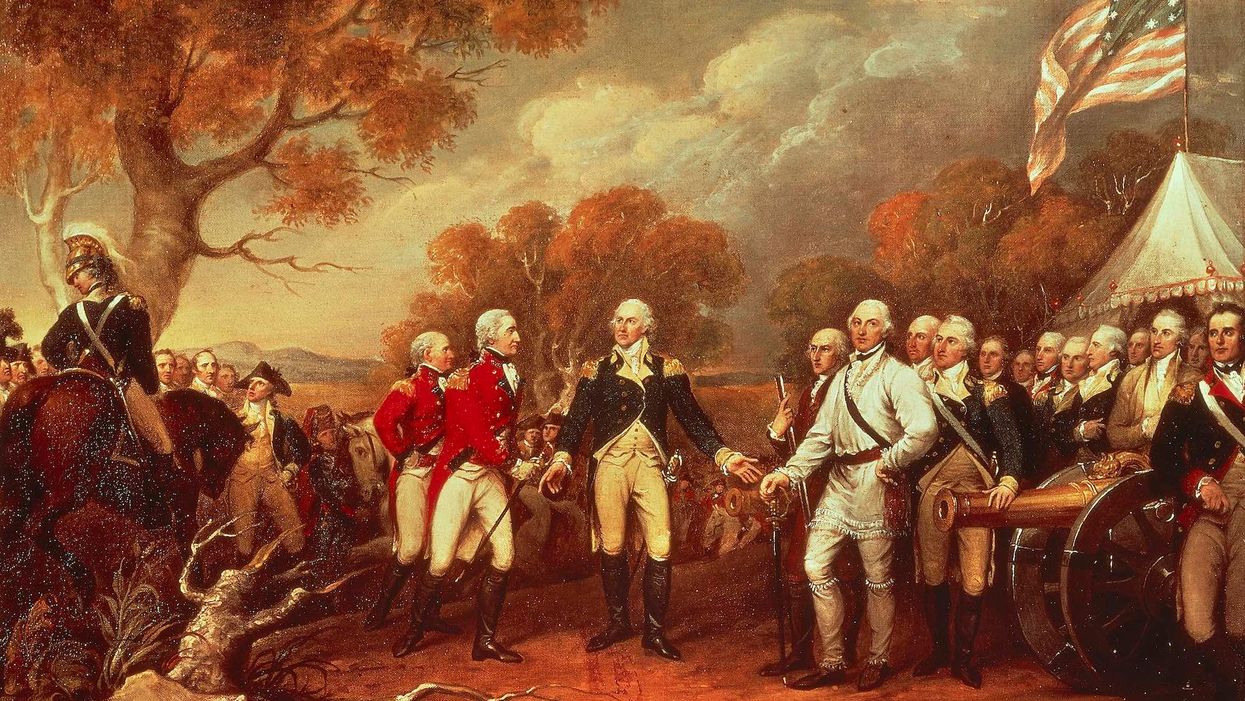
British Gen. John Burgoyne surrenders to American Gen. Horatio Gates on Oct. 17, 1777, following the Battle of Saratoga, New York. (Photo by DeAgostini/Getty Images)

Editor's note: In order to allow our staff to enjoy the 4th of July holiday with their families, TheBlaze will be running a series of articles today commemorating the Revolutionary War, which won America her freedom. God bless America, and all of you.
SARATOGA, NEW YORK (OCTOBER 17, 1777) — Rebel forces lead by Gen. Horatio Gates dealt a shocking blow to the British at the battles at Saratoga, New York. The redcoats led by Gen. John Burgoyne were horrified at the guerrilla tactics employed by the Americans, who are accused of targeted military officers with sharpshooters.
Gen. Burgoyne's plan was to march the 170 miles with his 8,000 troops from loyalist Canada and meet with the rest of the British army to cut off New England from the rest of the colonies. Rebel forces significantly slowed the march down by taking aim at the Native American guides that had aligned themselves with the British to defeat the patriots.
The first battle at Saratoga was a pyrrhic victory for the British, who advanced on a rebel encampment at Freeman's Farm at the cost of significant casualties. Burgoyne sent troops in three columns, but Gates' field commander Benedict Arnold sensed that the patriots would have a better advantage if they met the British in the woods rather than wait to defend their position.
Gates disagreed but after a heated argument that delayed the counterattack for hours, he relented.
Arnold was right — the woods provided the scrappy rebel sharpshooters the cover they needed to strike down the officers, a tactic that horrified the British as being against the rules of standard conduct of war. The British suffered nearly 600 casualties while the rebels only lost 300.
Although many credited Arnold for a considerable portion of the damage inflicted on the British, Gates has removed him as his second-in-command over their many personal disputes.
At the second battle of Saratoga on Oct. 7, Gates won a decisive victory at Bemis Heights despite having fewer troops than Burgoyne. Halfway through the battle, Arnold rode out to lead the troops and showed exemplary bravery that greatly aided the patriots' chances. He suffered a broken leg after being shot during the struggle.
Ten days later on Oct. 17, Burgoyne surrendered to Gates.
"We are sorry to say that Government have received the melancholy accounts that General Burgoyne and his army have been obliged to surrender themselves prisoners of war," reported the Edinburgh Evening Courant.
"After the Provincials had cut off General Burgoyne's supplies," the report continued, "part of his army fell back to secure their retreat to Ticonderoga & the Provincials, on this, surrounded General Burgoyne and the remainder."
"The provincials at first offered them quarter on their laying down their arms & gave them a quarter of an hour to consider of it, but General Burgoyne treated it with contempt & sent for answer that unless they would agreed to give them free passage to England & warranting their safety to their next place for embarkation they would die man by man before they parted with their arms," it continued. "The provincials soon complied with those conditions."
Burgoyne, who is also known as "Gentleman Johnny," lost about 1,000 men in the battles, while the Americans lost only about 500.
Arnold, despite earning a reputation for bravery to the point of recklessness in combat, had previously threatened to abandon the American cause and fight for the British after having his command taken away from him at Ticonderoga.
Various anonymous sources say the shocking upset at Saratoga is causing the Spanish to reconsider joining the French fight against the British. This would be a great boon to the patriots and possibly turn the tide against the British.
Sources: History.com, Wikipedia, Rare Newspapers, the History Channel.